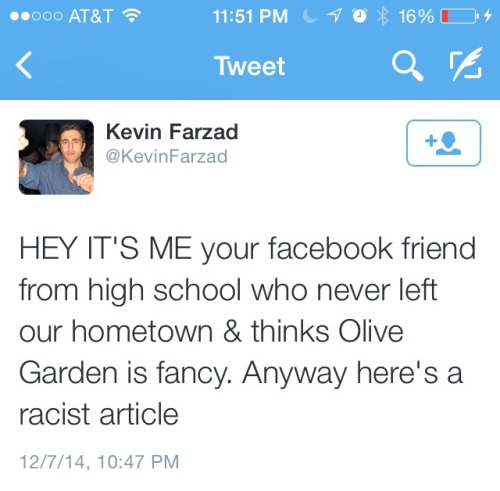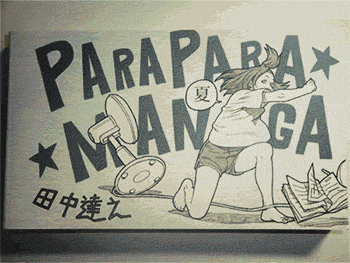Sophianotloren
Shared posts
"A local prosecutor announced on Friday he would not seek criminal charges against a Seattle police..."
- No Charges For Cop Who Broke Face Of Handcuffed Woman In Patrol Car
How to Draw Mushrooms on an Oscilloscope with Sound

In this surprisingly interesting video from Jerobeam Fenderson we watch (and listen) as he explains how to draw images using the visualizations of sound waves on an old analog Tektronix oscilloscope. To be clear: the images you’re seeing here are not being animated through software, instead Fenderson creates waveforms (sounds) using his computer, and those sound waves LOOK LIKE THIS when fed into an oscilloscope. Suffice to say there’s lots of math involved, and it’s all a little bit over my head, but luckily he answers some questions over on his blog about how it all works. Make sure to watch through to the end.
worth
Today is the 66th anniversary of the Universal Declaration of Human Rights.
Why not become a Patron of the Blasphemous Arts? Book shop here
beyond-thetime: zenpencils: WHAT TEACHERS MAKE by Taylor...
sockathans: jokes about communism aren’t funny unless you share them with everyone
jokes about communism aren’t funny unless you share them with everyone
amyw1nehouse: american historical films be like
american historical films be like
alex-v-hernandez: residentgoodgirl: About the French Minister...










wormwomanAbout the French Minister of Justice, Christiane Taubira:
- February 2, 1952: birth in Cayenne, French Guiana
- 1993-2012: she joins the National Assembly of France for French Guiana
- 1994-1999: she joins the European Parliament
- May 2001: she is the principal author of Loi n° 2001-434, a law that officially recogizes the atlantic slave trade and slavery as crimes against humanity [english], [french]
- 2002: she becomes the first black candidate and first black woman to run in the French presidential elections
- 2002-now: she publishes multiple books on the status of black people in French history and society
- November 2012: she introduces Projet de Loi n° 344 to the parliament. this bill goes on to become Loi no 2013-404, which legalizes same-sex marriage in france in may 2013 [x]. [here’s one of her speeches with english subtitles x]
- May 2013: she calls for the French government to redistribute land in the dom-tom (France’s Overseas Departments and Territories) to favour the descendants of slaves [x]
- October 2013: she (justifiably) calls out the front national for being racist, antisemitic, anti-arab and homophobic. the party retaliates by threatening to sue her [x]
- November 2013: she becomes the first black woman to be picked as Elle France’s Woman of the Year [x]
- June 2014: she encourages the parliament to pass a reform that emphasizes the use of probationary periods and rehabilitation for young offenders (as opposed to harsh jail sentences with no rehabilition), in order to prevent repeat offenses and reduce overcrowding in french prisons [x]
- July 2014: the court in cayenne gives anne-sophie leclère a 50 000 € fine, a 9 month jail sentence, and a 5 year ban from politics for comparing Taubira to a monkey [x] [video]
- November 2014: she takes to twitter to speak up against the grand jury’s decision not to indict darren wilson [x]
Swans in the mirror may be closer than they appear.

Swans in the mirror may be closer than they appear.
NAFTA, CAFTA, and what happens AFTA
"A Not-So-Free Trade Agreement: NAFTA, CAFTA. and the Upsurge of Violence and Instability in Central America"
Politics, University of San Francisco
No you shouldn't go teach English in Cambodia. Seriously.
International Development, McGill University
"New Practices, Same Old (Colonial) Representation: Neocolonial and Neoliberal Discourses in Cambodian Voluntourism Marketing"
thedirtyoldgentleman: gifthetv: [x] This is super important,...


[x]
This is super important, because it highlights a giant deep flaw in how we, as a society, have been speaking about racism (and to a lesser degree, things like sexism and homophobia).
Growing up, most of us have soaked in the message that racism is terrible and awful and demeaning. Yet the portrayal of racist behavior is rarely given a nuanced performance - it’s so often extreme Snidely-Whiplash-Moustache-Twirling-Evil awful. This comes from a good place - hey, let’s make sure that us white folks show just how deeply evil racism can be so we scare the crap out of everyone into not being racist.
Except… for us white folks, it didn’t work out that way. Because instead of understanding the insidious nature of racism, understanding our complicity in it and how we benefit from privilege, and how we can commit racial micro-aggressions every day without realizing it… people just don’t want to be that Snidely Whiplash racist shitbag asshole that they were raised to fear. So they shout super-loudly that they’re not that guy, to the exclusion of all dialogue and all reason, madly scrabbling away from the dialogue that we need to be having… because seriously… who wants to be a fucking villain?
We have to learn and admit to the fact that we can commit and perpetuate evil without being consciously evil - and understand that the price for admitting to that and being a better person is fucking chump change compared to the alternative of letting this shit go on.
Asean Johnson. Incredible...
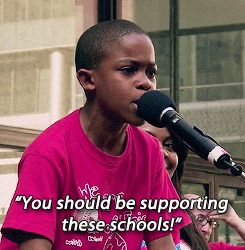
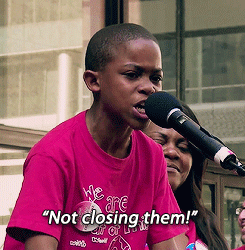
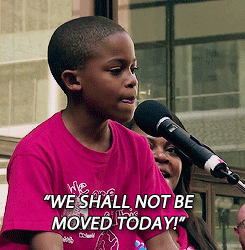

Asean Johnson. Incredible kid.
6gud:
"Rahm Emanuel is not caring about our schools; he is not caring about our safety. He only cares about his kids. He only care about what he needs. He do not care about nobody else but himself.
He let Barbara Byrd-Bennett, a woman that’s from Detroit who don’t even know the streets of Chicago where I’m from, come in and close these schools.” [x]Look at the passion y’all!!!
Teach the babies that their words matter yess
I feel like the surveillance state exists to make sure kids like this don’t succeed
his name is Asean Johnson and he was 9 when he gave this speech!!
thenearsightedmonkey: Dear Students, This! Prof. Bootsy
Meme Forty One of Fifty
 DAY FORTY-ONE: whatever tickles your fancy
DAY FORTY-ONE: whatever tickles your fancy
I’m not feeling tickled today. Unless you define “tickle” as “that feeling you get when a you are the horse and there is a thorn between the saddle and your ass.” If I have to endure one more sunny news story that is all “can’t we get along and just say Merry Christmas?” I am going to punch something.
That’s like saying “Oh, come on, don’t be a dick — just do it OUR way, and fuck your way, because you are wrong, anyhow.”
 So, that is not working for me. Christmas, after all, is not the first OR last holiday in this season. I am getting very weary of those intent on insisting it is the only one worth celebrating. This religious ‘there can be only one’ horseshit is so medieval. You know, as in back when religion ruled the world and people were racked, waterboarded*, burned if they looked like they might have an independent idea in their heads?
So, that is not working for me. Christmas, after all, is not the first OR last holiday in this season. I am getting very weary of those intent on insisting it is the only one worth celebrating. This religious ‘there can be only one’ horseshit is so medieval. You know, as in back when religion ruled the world and people were racked, waterboarded*, burned if they looked like they might have an independent idea in their heads?
So, my “fancy” or imagination could be tickled if certain folks could acknowledge that “freedom of religion” means ANY religion … and even NO religion.
*Don’t even pull that detonator cord, ok? Back then they didn’t LIE and say it wasn’t torture — so we’ve fallen somewhere deeper off the edge of the reality map, haven’t we?
Tagged: freedom of religion, freedom-from-religion, memes
Insanely Over-Privileged and Self-Impressed Academic of the Day
…The great wjts in comments:
Men of Harvard, whine to glory,
Victory is hov’ring o’er ye,
Four whole dollars stand before ye,
Hear ye not their call?
At your sloth they seem to wonder;
Pick the menu’s costs asunder,
Let entitled, deaf’ning thunder
Bartenders appall.
E-mails loudly wanking,
Poor consumers thanking;
With the gripes of B-School shites,
The Rest’rant’s business tanking;
Your foes on every side assailing,
Forward press with heart unfailing,
‘Till Ran Duan learns with quailing,
Cambridge ne’er can yield!
Star Light, Star Bright…
 …there are no stars to be seen in my sky tonight. Heavy clouds are drenching us with rain. So only the large seven-pointed stars of foil, in the living room and kitchen window are shining brightly in the dark, wet, winter’s night.
…there are no stars to be seen in my sky tonight. Heavy clouds are drenching us with rain. So only the large seven-pointed stars of foil, in the living room and kitchen window are shining brightly in the dark, wet, winter’s night.
But I sure could use a star to wish upon tonight. The news is depressing. No, not the released information about just what was done to any unfortunate seized on suspicion of being a terrorist or “enemy combatant” — I already KNEW those things. They have considerably added to my reasons for despair and depression since about 2003.
But news of individual acts of savagery — someone pouring accelerant all over a 19 year old girl…even into her throat and nostrils and setting her afire, for instance. Oh, those are the news stories that make me shake my head in confusion; how could anyone do such a horrible thing to such a young woman — a virtual child? Is this what the requiem of America looks like? Such incredible acts of cruelty perpetrated upon the young? So many young people buried by their grief-stricken parents of late seems so unnatural.
Fear and hate seem to walk our streets. I met a woman today: she was my age and she said she hated going out to shop alone — because she was afraid of being robbed or attacked. I can remember when that would have been a very strange thing to hear from an older woman in America in an average city, and in a fabric store, for pity’s sake!
I have no more answers, I feel ever more silenced by the enormity of wrong. The clouds are raining down upon us; there certainly is sufficient reason for tears. We seem to have lost more than wishing stars, as a nation — I think we’ve lost the stars we used to follow, in hard times or in good ones. And I think we will need more than NASA to re-locate some beacon of reason and justice in this century.
Filed under: PTSD Journals, WTUnholyF? Tagged: death, justice-for-jessica, murder
Dear President Obama…
 …and also any white person, who says, like the doughy woman on the news “Can’t we just move ON now, and think of Christmas?” when she was asked about the protests about Ferguson and other places where young blacks are shot down by police on any slim excuse.
…and also any white person, who says, like the doughy woman on the news “Can’t we just move ON now, and think of Christmas?” when she was asked about the protests about Ferguson and other places where young blacks are shot down by police on any slim excuse.
No, we can’t move on. And Christmas? Seriously? Just who would your precious Jesus shoot for being the wrong color, anyhow? Do you think J.C. Superstar would be out shopping or marching in Ferguson?
President Obama thinks we need to just keep “working” on racism. Yeah, about that, Sir? You could work harder on that yourself, instead of being so compliant, so patient while the country erupts in open institutionalized racism I’ve not seen the equal of since I was ten years old! People of your color are dying, Mr. President and you are making inadequate excuses for their killers.
Certain guiding lights are going out in America. At least, that is what it feels like to me. I am in a home surrounded by family and peace and yet it feels like a ocean tidal wave is waiting outside in the darkness. People abroad look at America now; and yes, like me they think a special kind of stupidity, insanity and viciousness is at work here.
While my personal life is happier than at any time I can recall, it is still the deepest winter of my discontent (and no, not “made glorious” by current events, thank you Will Shakespeare)… I’ve been watching the GOP dismantle any idea of functional government in order to take down one black man. But, America? He is not going down alone.
We will all have plenty to regret if we don’t get the fever of racism damped down, stomped out — before, like a forest fire in the dry season, it burns us all down. No justice, no peace. Twenty-five years ago, in the twilight of my attempt at Catholicism, that bumper sticker adorned the cars at St. Leo’s on Tacoma, Washington’s “Hilltop”. That message is not being heard STILL, and that is why every injustice is greeted with protests that can turn to riots, with grief that starts fires of rage. As the Spiegel article linked to above says — the people lighting the fires have learned that nothing save violence gets them listened to at all: “If we don’t tear anything down, if we don’t destroy anything, if we don’t set fire to anything, they won’t even pay attention,“
If we can’t hear the weeping, the anger, the cries for justice….we will hear the fire alarms, the sirens and the roar of flames in the night. And not, as a white woman said in the linked article, because “black people don’t know how to act….they are like animals”. But because they are treated like animals and have very little left to lose.
We worry about the radicalization of young Islamic men across the planet; we would be better off thinking about Christmas after all perhaps? Well, Christmas as I recall it at St. Leo’s — with a heavy dose of social justice for ALL. Yes, liberation theology, bitches. More than candles will light the night if we don’t ALL start listening to the real story in America, we are radicalizing our own desperate citizens right here and now. And Christmas ain’t gonna fix that….
Filed under: Politics, PTSD Journals, Religious Nuts & Bolts, War & No Peace Tagged: black-lives-matter, police brutality, racism
AdNauseam Browser Extension Quietly Clicks On Blocked Ads
Read more of this story at Slashdot.
This is Not What “Exceptional” Means

The release of the Senate Select Committee Study of the Central Intelligence Agency’s Detention and Interrogation Program reveals things we basically already knew or should have known about the CIA program—it was worse than reported, it yielded little to no useful information, and it was run by liars who repeatedly tried to project that they were not performing acts of torture when they were in all actuality, textbook acts of torture.
There are people who seem to believe that releasing this information somehow endangers Americans here and abroad. Since this report details things that actually happened, I would say that the actual program of torture run by an agency of the United States government is what was actually harmful. Much of the information had already been reported in news publications; this report is just filing in the blanks. For that matter, this is just what was unclassified after certain details had been scrubbed, leaving the possibility that there are things yet worse that we don’t know—but what is here is pretty starkly disgusting.
It has never escaped my notice that the use of torture is not reliable and has the potential for severe blowback—this was authorized by people who should have known those things. The program was devised by people who should have known better (and got paid some $81 million to not know better). If torture was used by the Inquisition to get people to confess to cavorting with demons, or by the Reds to get false confessions out of captured soldiers, why would it somehow become a force for getting truthful confessions from detainees in the GWOT? It simply makes no sense that battered and broken people who are dissociated by their treatment are now going to impart reliable intelligence. Because why? Because we’re so nice? No! They’ll lie their asses off to save what remains of their hides! And as far back as the Revolutionary War, George Washington had stern things to say about torture—he believed it brought disgrace on the nation. And so it does.
The fear of discussing this doesn’t seem to be about repercussions from terror groups like ISIL, who don’t love us to start with, and are a nice little pack of torturers, beheaders, slavers and rapists anyway, and so have no huffy high ground to claim. It’s rather about confronting the evil that was carried out in our name for no good reason, which lowered us to the level of the things we hate, and put into question our very idea of American Exceptionalism.
I’ve said before, if American Exceptionalism is to mean anything, it can not mean something like “Wars of choice, indefinite detentions without charges, and torture are criminal…except when we do them”. To be a great example among nations, it’s no good to simply have great values. We have to also stand up for those values, or the result is sheer hypocrisy—an insult to our national reputation on top of the injury to our national conscience. Siding with the program, after it has been revealed to be disgusting, haphazard, ineffective, and full of lies, is nothing more than tending to a wounded amour-propre having found one’s idols were made of molded chicken shit.
Speaking of poultry-manure-based golems, former Vice-President Cheney has dismissed the report as “hooey”. His gripe is that the CIA was not rogue, but that the entire operation was “authorized”. So much for any attempt to play at being “out of the loop”. Cheney himself does seem to have been well in the loop on this. Which, as he’s been one of the torture program’s biggest cheerleaders, surprises me very little. Since the program itself is hair-raisingly illegal, I have to feel a certain frisson of deja vu in a sort of Nixonian “when the President does it, it isn’t illegal” kind of way about his phrasing. But to return to my libretto—torture gets false information, as it did when Ibn al-Shaykh al-Libi made a connection between al-Qaeda and Saddam Hussein under torture. Which became the basis of a war that was at the very least, lucrative to his former (?) company. (Although ever so much more could be said about that.)
If the principals involved in making the decision to permit these actions truly believed that they had been doing the good and right things in this country’s interests, they wouldn’t want to hide their light under a bushel. But these things were not done for wholesome and noble reasons of “keeping us safe”, so they prefer those deeds stay in the dark. And anyhow, however were those tactics ever thought to get good results? Was becoming more grotesque than “the enemy” supposed to somehow make us “more right”? Since anyone knowing well enough how to do proper interrogation would have disdained these very tactics for the quackery they were, who championed them? How was it supposed to work, really, to keep us safe? To get good humint seems besides the point. To exploit the flesh at hand per discouragez les autres? As some great prophylactic fetish charged with human misery? Can someone tell me how “forced rectal feeding” was supposed to “keep us safe”?
To be exceptional, I think, is to make no exception in the law for elites who practice this kind of bullshit and to this day, defend it in the teeth of evidence it was of no practical value, and even a source of (expensive and long-lasting) harm.
(X-Posted at Strangely Blogged.)
Taxpayers pick up the tab for violent, abusive, murdering cops 99.8% of the time

99.8% of the $735 million paid out by in 9,225 large-city police misconduct settlements came from tax revenues; 0.2% was paid by the officers who committed the infractions. In more than 80 small/mid-sized cities studied, police officers contributed nothing to settlements for their misconduct.
Read the rest
Strike Student Debt
How much is your student debt really worth? Probably less than you think. Most people are not aware that creditors sell off defaulted debt for pennies on the dollar to a shadowy market of debt buyers and collectors who then try to collect the full amount from the debtor. A New York–based activist collective, Strike Debt, created the Rolling Jubilee fund to buy debt on this secondary market just as debt collectors do. Only instead of collecting on that debt, Strike Debt erases it. Rolling Jubilee has now forgiven almost $4 million in student loans for the bargain price of a little more than $100,000.
Since 2012, Strike Debt has bought up almost $15 million in medical debt — obligations that people incur when they are sick or have an accident but can’t pay their medical bills. This is an admittedly minuscule amount in a multibillion dollar market, but the point of the Rolling Jubilee is to illustrate that debts are written off all the time, just not typically in favor of the debtor. Further proof of the power of creditors is that the government guarantees profits on most kinds of student loans, so they are not for sale on the secondary market. However, we found that some forms of private tuition debt are available for purchase.
Once people realize how little student loans are really worth to the creditors who sell them for pennies on the dollar, they might ask why they should pay the full amount.
Our most recent purchase was a portfolio of private student loan debt held by 2,761 people who attended Everest College, a division of the Corinthian Colleges (CCI) for-profit network. There are over 100 Everest campuses and online degree programs in two dozen states. Since the 1990s, Corinthian has enrolled hundreds of thousands of people in pricey vocational programs, encouraged them to take out student loans and then used those dollars to enrich officials and shareholders — a business model that is little more than legalized theft that funnels money from public to private hands. During its heyday, Corinthian received more than $500 million annually from the federal Pell Grant program, more than the entire University of California system.
Earlier this summer, Corinthian was finally pushed off a financial cliff when the Department of Education (DOE), along with more than a dozen other federal and state agencies, launched an investigation into the company’s deceptive tactics, including lying about graduation rates and employment options for degree holders. An official in the California attorney general’s office testified that the company engaged in the “most persistent, egregious and widespread” abuse of students she had ever seen. And when the DOE temporarily cut off Corinthian’s access to federal funds, the college announced that bankruptcy was imminent.
By abolishing the private debt of Everest College students, we hope to illustrate how the federal government, through its support of market-based reforms in higher education, is more interested in protecting for-profit schools than students.
When CCI announced its bankruptcy, rather than rushing to the aid of students, the DOE stepped in to save Corinthian from collapse, appointing a monitor to help the company negotiate the sale of most of its 107 campuses to an unnamed buyer.
The sale is part of the federal government’s ongoing effort to bring market-based reforms to higher education at all levels. The DOE says it is protecting taxpayers from having to reimburse students who would be eligible for a debt discharge if their campus shut down. But why should students have to pay while the company that defrauded them gets a helping hand?
Instead of answering that question, the DOE has been focused on requiring colleges to ensure their value to consumers. Colleges whose graduates don’t find jobs and repay their student loans in a timely fashion would be ineligible for federal funds. The proposed college rating system would treat education as a commercial product and students as customers who simply need better information to choose a college — the way they choose a brand of cereal.
The thinking behind President Barack Obama’s higher education policy is also behind the DOE’s effort to save Corinthian. If Corinthian is just a bad brand in an otherwise healthy education market, then assuring the sale of the campuses is in the best interest of students. Yet according to federal rules, students whose campuses are sold will be rendered ineligible for a discharge of their loans. Those with the most to lose have had no voice in the debate about what happens to Corinthian. Defrauded students are at the mercy of the DOE as it pursues a strategy of weeding out bad brands instead of defending their interests.
The federal government’s response to the Corinthian debacle should push us to ask deeper questions about the role of college in helping people achieve economic security.
In addition to being buried by debt, many people find themselves under- or unemployed even after earning a college degree. The widening gap between the rich and poor is a bigger problem than the gap between those who attended college and those who didn’t. As the Economic Policy Institute recently reported, “Education is not the cure for high unemployment or for income inequality.” Tressie McMillan Cottom has further explained that “for those of us looking for economic security who are not fortunate or able enough to be fast-tracked into the good jobs, there isn’t much college can do.”
Policies that encourage broad access to quality higher education are worth fighting for, but they shouldn’t blind us to the reality that a diploma produces an economic benefit only when access to the resources one needs to thrive, including a fair income, are available.
If one takes a step back and looks at the economy as a whole, it’s clear that Corinthian is not just a bad operator in an education marketplace that provides struggling students and families with a path to dignity and security.
Instead, CCI’s alleged crimes provide a startlingly clear example of a crisis of inequality that can’t be solved by ensuring that colleges operate according to market-based logic. Nor can it be solved by protecting Corinthian from the outcome of its actions, at the expense of students who deserve to have their debts discharged.
People with private loans from for-profit colleges are not the only ones who ought to have their debts canceled. In fact, all students should have the right to learn and prepare for careers without the burden of a lifetime of debt. To offer this kind of real value, public higher education should be free. Current debtors should have the opportunity to negotiate a write off of their debts, just as creditors do. Strike Debt bought student loans for pennies on the dollar. The question student debtors around the country should start asking is, “Why should we pay more?”
– This article originally appeared in Al Jazeera America
Life After Debt: Why America Needs an Anti-Capitalist Left
Does America need a Left? Yes, very much. We need a Left that rejects a vision of politics based on the expansion of an unjust economic system, which is to say that we need a Left that rejects James Livingston’s advice that we “compromise with the world as it actually exists.” This is not a call to reject pragmatism, but rather to acknowledge that the “world as it actually exists” has for too long been defined through reactionary terms. We argue instead for an activist, avowedly anti-capitalist Left, one that seeks to tear away the constraints that have impeded necessary, fundamental change.
The Left, which for too long has capitulated to rules of engagement established by conservatives, needs to work to find alternatives to our present debt-financed society.
Unfortunately, this Left, though it exists in fragments, is overshadowed in the United States. Those who would claim the mantle of the Left have tried for too long to advance their goals by appeasing the Right, hoping, misguidedly, to find common cause and to compromise their way into a better world. The progressive movement—the institutions, think tanks, pundits, and politicians that currently stand in as the serious spokespeople of the Left—speaks of “good jobs,” “economic growth,” and “regulated markets,” appealing to a mythical middle ground that has never and cannot exist. By capitulating the very terms of engagement to conservatives, progressives have distorted their message and acted against the interests they purport to serve.
America needs a Left that does not, as Michael Lerner noted, approach the question of social change in an “economistic” fashion. The progressives that dominate political discussion and action share in common a vision of change as emerging via market mechanisms. This mainstream Left is beyond rehabilitation. We believe, like Eli Zaretsky, that “progress is blocked by the same internal capitalist dynamic that created progress in the first place.” We must counter capitalism not by appealing to it, but by opening space for people to no longer be dominated by its logics. The demand for such a Left is undeniable. What’s missing is only the political will to see it through.
Read the rest of this article (co-authored with Henry Ostrom) in Tikkun.
Credit Where Credit’s Due
![KGrHqViMF3Z-kKBQZvMGro60_35[1]](http://annaraccoon.com/wp-content/uploads/2014/12/KGrHqViMF3Z-kKBQZvMGro60_351.jpg) My name is Petunia Winegum and I’ve never had a debt in my life. One of those statements is true, and as this essay is not about nom-de-plumes, I take it you can guess which one. I’m actually the only person I know who never has had a debt in their life. Firstly, I didn’t engage in any further education and therefore never had to cope with loans or tuition fees; secondly, I’ve never owned my own home, so have never had to struggle with a mortgage; and thirdly, I’ve never had a credit card. Ah, yes – your flexible friend.
My name is Petunia Winegum and I’ve never had a debt in my life. One of those statements is true, and as this essay is not about nom-de-plumes, I take it you can guess which one. I’m actually the only person I know who never has had a debt in their life. Firstly, I didn’t engage in any further education and therefore never had to cope with loans or tuition fees; secondly, I’ve never owned my own home, so have never had to struggle with a mortgage; and thirdly, I’ve never had a credit card. Ah, yes – your flexible friend.
In the 1970s and for most of the 80s, the credit card was a coveted luxury of the wealthy; I certainly don’t recall any TV ads for credit cards showing a harassed housewife doing her weekly shop at Spar; these passports to the jet-set were always employed as payment in a casino or five-star hotel, promoted by gentlemen whose cigarettes were kept in a silver case and ladies whose virtue was kept in an eighteen-hour girdle. This was a time when the cheque book retained an air of elitism about it, after all, and there were few hints then that the credit card would descend the social ladder and threaten the stranglehold notes and coins still had on the average shopper. Although the genesis of the credit card can be traced back as far as 1920s America, it wasn’t until as late as 1966, with the launch of Barclaycard, that credit cards began to become tools of exchange in Britain. The American Express charge card had been introduced in the UK three years previously, limited to 3,000 British outlets, but Barclaycard was the first recognisably modern all-purpose credit card to be issued in Britain. This revolutionary format had appeared in 1958 with the Bank of America’s pioneering BankAmericard, an advancement on the range of different charge cards that were, in most cases, restricted to a handful of specific businesses at a time.
It’s interesting to note, however, that the problems this system would eventually lead to in the UK had already occurred in the States. Almost immediately after it was launched, the BankAmericard was mailed out to customers viewed as low credit risks, a move which resulted in the racking up of astronomical debts when the card inevitably fell into the hands of those who imagined they had been delivered a winning lottery ticket. This unsolicited scheme was outlawed in 1970, by which time over 100 million Americans had received a BankAmericard through the post.
British distribution of the credit card at least learnt from this disaster, and Barclaycard was introduced cautiously, its initial beneficiaries being men of business and the generally affluent. Even in the US, the spread of credit cards as a legitimate, universal method of acquiring goods was restricted by legislation that prevented banks from operating in more than one State; Bank of America was licensed in California, but found a way around federal laws by licensing the BankAmericard to banks based outside California. When Bank of America expanded its operations on an international scale in the late 60s, the BankAmericard was licensed to foreign banks, with the sole issuer in Britain being Barclaycard. Indeed, due to the minority use of credit cards in the UK at the time, Barclaycard held a monopoly on the market until the Access Card was introduced in 1972.
Within twenty-five years of the arrival of the Access Card, Britain underwent a monetary revolution, with ‘invisible money’ becoming the prime source of purchasing across the board, regardless of social standing. The increased availability of the credit card by the time of New Labour’s ‘Boom without Bust’ boast meant it had by now ceased to be the golden ticket of the wealthy and enabled even the poorest households to acquire the chattels that had been marketed as life-saving necessities in the eternal struggle of keeping up with the Jones’s. Students were also now a favoured target for banks and building societies; faced with outrageous tuition fees for an education that their parents had received free of charge, students were sold the credit card as a means of easing their passage through university, and with more young people than ever before entering Academia – courtesy of Tony Blair’s zealous drive to democratise higher education – there was a huge untapped audience available to be fleeced by unscrupulous banks and credit card companies. Debts incurred from a credit card would combine in an unholy alliance with debts incurred from tuition fees to render an entire generation in hoc for the majority of their adult lives. Any rules and regulations that had previously existed to prevent the exploitation of the penniless and financially vulnerable were swept aside as the public were told it was their duty to spend.
High street spending was integral to the economic stability Blair and Brown presided over, prompting the Iron Chancellor to make his famous proclamation that Labour had ended the cycle of boom & bust that had tarnished the economic reputations of their predecessors. Low interest rates and low inflation contributed to this climate, and as housing prices soared, householders were saving less and spending more; in order to spend as much as was required of them, borrowing increased and the credit card was the essential tool in purchasing goods without the ready cash for them being available. Oddly enough, nobody during this era of hedonistic acquisitiveness seemed capable of seeing any further than the next item on their shopping list, although hindsight shows this was a situation that was simply unsustainable. The country was living on borrowed time, just as its citizens were living on borrowed money.
When the whole country had been surviving on credit, residing in homes they’d been led to believe they owned and surrounded by goods they’d purchased without paying for them, the extravagance of bankers didn’t seem out-of-step; the generating of wealth and the alleged democracy of it was crucial to the boom era, and as long as everybody benefitted from it, why should conspicuous consumption and the flaunting of affluence be seen as remotely vulgar or overtly ostentatious? Thatcher’s boom had largely been limited to a small section of society, whereas Blair’s boom had been more widespread and the gap between the haves and the have-nots – however superficial – appeared to be narrowing. Indeed, why should someone engaged in menial work on the minimum wage have been offended by the sight of a City boy quaffing champagne when he or she could nip into their local supermarket and purchase the same brand of bubbly on their credit card and effectively replicate the pose?
However, when the credit crunch began to bite, when businesses began to go bust, when workers began to be laid off, when interest rates began to rise, when homes began to be repossessed and when the kind of lifestyle Joe Public had become accustomed to had to be reluctantly relinquished, it was the bankers and Gordon Brown who were seen as the men who had got their sums wrong. But then, so had everybody else.
Four years on from the mother of all busts, I approached my bank with the intention of opening an account that would enable me to buy goods online, for which I needed a card. At first, my application was rejected due to the fact that a credit check revealed I had no debts hanging round my neck. One would imagine that would have worked in my favour, but apparently not. It was almost as though I was viewed as suspect for not having any debts; what the hell was wrong with me? The problem was eventually sorted, but this initial obstacle said more to me about the state of financial affairs in this country than any exhaustive examination on ‘Panorama’. Maybe it’s my age, but I still feel debt has shame attached to it; most younger than me don’t appear to. They have accepted it as part of life. But by making a soft target such as bankers the cartoon villains on whom to pin the blame for Britain’s economic ills, the public are effectively absolved of their part in what has happened since 2008. If debtor’s gaols were still with us, however, the allure of your flexible friend may have been less irresistible.
© Petunia Winegum

